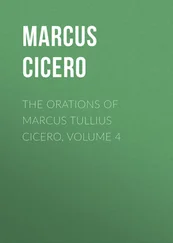Marcus Cicero - Cicero's Tusculan Disputations
Здесь есть возможность читать онлайн «Marcus Cicero - Cicero's Tusculan Disputations» — ознакомительный отрывок электронной книги совершенно бесплатно, а после прочтения отрывка купить полную версию. В некоторых случаях можно слушать аудио, скачать через торрент в формате fb2 и присутствует краткое содержание. Издательство: Иностранный паблик, Жанр: foreign_antique, Философия, foreign_edu, на английском языке. Описание произведения, (предисловие) а так же отзывы посетителей доступны на портале библиотеки ЛибКат.
- Название:Cicero's Tusculan Disputations
- Автор:
- Издательство:Иностранный паблик
- Жанр:
- Год:неизвестен
- ISBN:нет данных
- Рейтинг книги:3 / 5. Голосов: 1
-
Избранное:Добавить в избранное
- Отзывы:
-
Ваша оценка:
- 60
- 1
- 2
- 3
- 4
- 5
Cicero's Tusculan Disputations: краткое содержание, описание и аннотация
Предлагаем к чтению аннотацию, описание, краткое содержание или предисловие (зависит от того, что написал сам автор книги «Cicero's Tusculan Disputations»). Если вы не нашли необходимую информацию о книге — напишите в комментариях, мы постараемся отыскать её.
Cicero's Tusculan Disputations — читать онлайн ознакомительный отрывок
Ниже представлен текст книги, разбитый по страницам. Система сохранения места последней прочитанной страницы, позволяет с удобством читать онлайн бесплатно книгу «Cicero's Tusculan Disputations», без необходимости каждый раз заново искать на чём Вы остановились. Поставьте закладку, и сможете в любой момент перейти на страницу, на которой закончили чтение.
Интервал:
Закладка:
II. To these we may add the poets; who, on account of the appearance they exhibit of learning and wisdom, are heard, read, and got by heart, and make a deep impression on our minds. But when to these are added the people, who are, as it were, one great body of instructors, and the multitude, who declare unanimously for what is wrong, then are we altogether overwhelmed with bad opinions, and revolt entirely from nature; so that they seem to deprive us of our best guide who have decided that there is nothing better for man, nothing more worthy of being desired by him, nothing more excellent, than honors and commands, and a high reputation with the people; which indeed every excellent man aims at; but while he pursues that only true honor which nature has in view above all other objects, he finds himself busied in arrant trifles, and in pursuit of no conspicuous form of virtue, but only some shadowy representation of glory. For glory is a real and express substance, not a mere shadow. It consists in the united praise of good men, the free voice of those who form a true judgment of pre-eminent virtue; it is, as it were, the very echo of virtue; and being generally the attendant on laudable actions, should not be slighted by good men. But popular fame, which would pretend to imitate it, is hasty and inconsiderate, and generally commends wicked and immoral actions, and throws discredit upon the appearance and beauty of honesty by assuming 93a resemblance of it. And it is owing to their not being able to discover the difference between them that some men ignorant of real excellence, and in what it consists, have been the destruction of their country and of themselves. And thus the best men have erred, not so much in their intentions as by a mistaken conduct. What? is no cure to be attempted to be applied to those who are carried away by the love of money, or the lust of pleasures, by which they are rendered little short of madmen, which is the case of all weak people? or is it because the disorders of the mind are less dangerous than those of the body? or because the body will admit of a cure, while there is no medicine whatever for the mind?
III. But there are more disorders of the mind than of the body, and they are of a more dangerous nature; for these very disorders are the more offensive because they belong to the mind and disturb it; and the mind, when disordered, is, as Ennius says, in a constant error: it can neither bear nor endure anything, and is under the perpetual influence of desires. Now, what disorders can be worse to the body than these two distempers of the mind (for I overlook others), weakness and desire? But how, indeed, can it be maintained that the mind cannot prescribe for itself, when she it is who has invented the medicines for the body, when, with regard to bodily cures, constitution and nature have a great share, nor do all who suffer themselves to be cured find that effect instantly; but those minds which are disposed to be cured, and submit to the precepts of the wise, may undoubtedly recover a healthy state? Philosophy is certainly the medicine of the soul, whose assistance we do not seek from abroad, as in bodily disorders, but we ourselves are bound to exert our utmost energy and power in order to effect our cure. But as to philosophy in general, I have, I think, in my Hortensius, sufficiently spoken of the credit and attention which it deserves: since that, indeed, I have been continually either disputing or writing on its most material branches; and I have laid down in these books all the discussions which took place between myself and my particular friends at my Tusculan villa. But as I have spoken in the two former of pain and death, this book shall be 94devoted to the account of the third day of our disputations.
We came down into the Academy when the day was already declining towards afternoon, and I asked one of those who were present to propose a subject for us to discourse on; and then the business was carried on in this manner:
IV. A. My opinion is, that a wise man is subject to grief.
M. What, and to the other perturbations of mind, as fears, lusts, anger? For these are pretty much like what the Greeks call πάθη. I might call them diseases, and that would be a literal translation, but it is not agreeable to our way of speaking. For envy, delight, and pleasure are all called by the Greeks diseases, being affections of the mind not in subordination to reason; but we, I think, are right in calling the same motions of a disturbed soul perturbations, and in very seldom using the term diseases; though, perhaps, it appears otherwise to you.
A. I am of your opinion.
M. And do you think a wise man subject to these?
A. Entirely, I think.
M. Then that boasted wisdom is but of small account, if it differs so little from madness?
A. What? does every commotion of the mind seem to you to be madness?
M. Not to me only; but I apprehend, though I have often been surprised at it, that it appeared so to our ancestors many ages before Socrates; from whom is derived all that philosophy which relates to life and morals.
A. How so?
M. Because the name madness 35 35 Insania—from in , a particle of negative force in composition, and sanus , healthy, sound.
implies a sickness of the mind and disease; that is to say, an unsoundness and an unhealthiness of mind, which they call madness. But the philosophers call all perturbations of the soul diseases, and their opinion is that no fool is ever free from these; but all that are diseased are unsound; and the minds of all fools are diseased; therefore all fools are mad. For they held that soundness of the mind depends on a certain 95tranquillity and steadiness; and a mind which was destitute of these qualities they called insane, because soundness was inconsistent with a perturbed mind just as much as with a disordered body.
V. Nor were they less ingenious in calling the state of the soul devoid of the light of the mind, “a being out of one’s mind,” “a being beside one’s self.” From whence we may understand that they who gave these names to things were of the same opinion with Socrates, that all silly people were unsound, which the Stoics have carefully preserved as being derived from him; for whatever mind is distempered (and, as I just now said, the philosophers call all perturbed motions of the mind distempers) is no more sound than a body is when in a fit of sickness. Hence it is that wisdom is the soundness of the mind, folly a sort of unsoundness, which is insanity, or a being out of one’s mind: and these are much better expressed by the Latin words than the Greek, which you will find the case also in many other topics. But we will discuss that point elsewhere: let us now attend to our present subject. The very meaning of the word describes the whole thing about which we are inquiring, both as to its substance and character. For we must necessarily understand by “sound” those whose minds are under no perturbation from any motion as if it were a disease. They who are differently affected we must necessarily call “unsound.” So that nothing is better than what is usual in Latin, to say that they who are run away with by their lust or anger have quitted the command over themselves; though anger includes lust, for anger is defined to be the lust of revenge. They, then, who are said not to be masters of themselves, are said to be so because they are not under the government of reason, to which is assigned by nature the power over the whole soul. Why the Greeks should call this mania, I do not easily apprehend; but we define it much better than they, for we distinguish this madness ( insania ), which, being allied to folly, is more extensive, from what we call furor , or raving. The Greeks, indeed, would do so too, but they have no one word that will express it: what we call furor , they call μελαγχολία, as if the reason 96were affected only by a black bile, and not disturbed as often by a violent rage, or fear, or grief. Thus we say Athamas, Alcmæon, Ajax, and Orestes were raving ( furere ); because a person affected in this manner was not allowed by the Twelve Tables to have the management of his own affairs; therefore the words are not, if he is mad ( insanus ), but if he begins to be raving ( furiosus ). For they looked upon madness to be an unsettled humor that proceeded from not being of sound mind; yet such a person might perform his ordinary duties, and discharge the usual and customary requirements of life: but they considered one that was raving as afflicted with a total blindness of the mind, which, notwithstanding it is allowed to be greater than madness, is nevertheless of such a nature that a wise man may be subject to raving ( furor ), but cannot possibly be afflicted by insanity ( insania ). But this is another question: let us now return to our original subject.
Читать дальшеИнтервал:
Закладка:
Похожие книги на «Cicero's Tusculan Disputations»
Представляем Вашему вниманию похожие книги на «Cicero's Tusculan Disputations» списком для выбора. Мы отобрали схожую по названию и смыслу литературу в надежде предоставить читателям больше вариантов отыскать новые, интересные, ещё непрочитанные произведения.
Обсуждение, отзывы о книге «Cicero's Tusculan Disputations» и просто собственные мнения читателей. Оставьте ваши комментарии, напишите, что Вы думаете о произведении, его смысле или главных героях. Укажите что конкретно понравилось, а что нет, и почему Вы так считаете.












